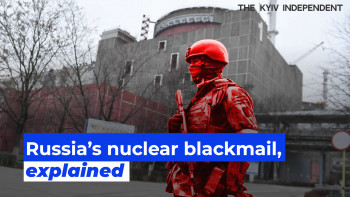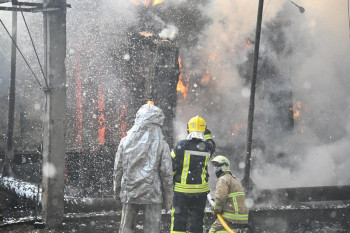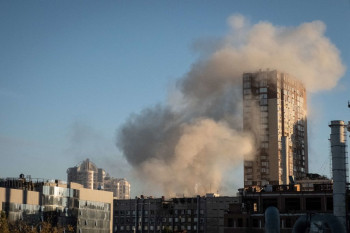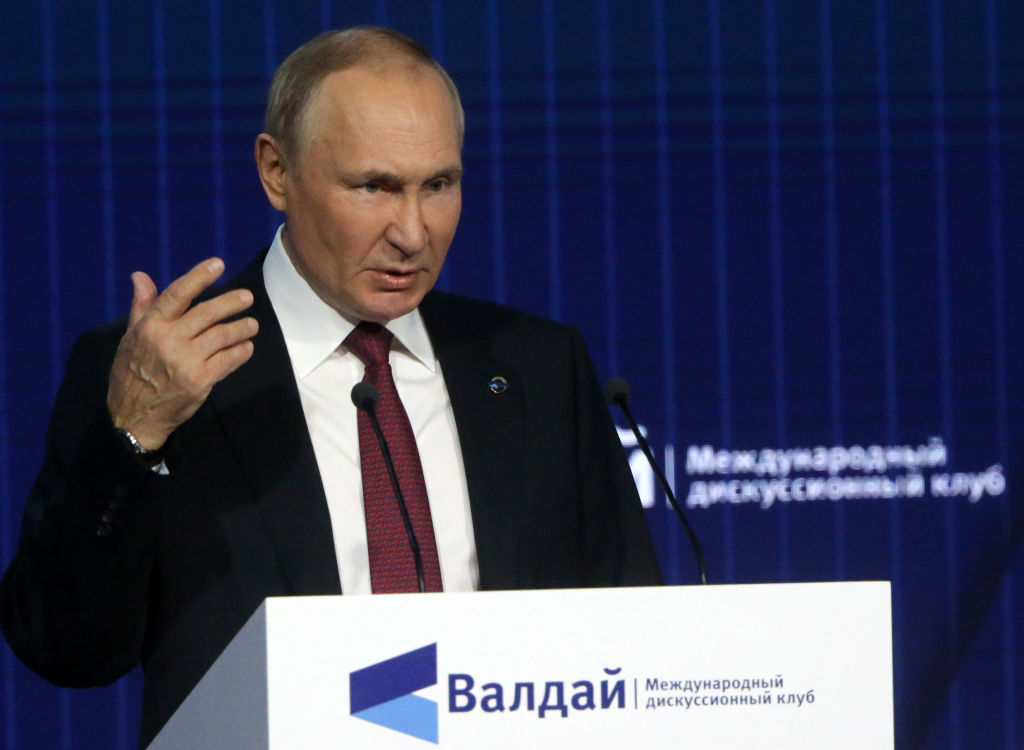Key developments on Oct. 27:
- Zelensky signs law to increase defense, security spending by $10.5 billion
- Kyiv faces unprecedented power cuts following Russian attacks
- Ukraine, Russia conduct 28 prisoner swap since February
Russian dictator Vladimir Putin backed down on nuclear threats on Oct. 27, after repeatedly warning to use nuclear weapons when talking about the war with Ukraine.
Speaking at a meeting of the Valdai Discussion Club, a Moscow-based geopolitical think-tank, on Oct. 27, Putin said that Russia “had never talked about using nuclear weapons," and that a nuclear strike on Ukraine will make neither political nor military sense.
He also accused the West, including former U.K. Prime Minister Liz Truss, of "engaging in nuclear blackmail" against Moscow.
In the past months, Putin has repeatedly made statements that many saw as nuclear blackmail.
During his Sept. 30 speech in which he declared the illegal annexation of four Ukrainian regions, Putin again said he would employ “all means” available to defend so-called “Russian lands.”
Putin also claimed that Ukraine has the technology to create and potentially detonate a "dirty bomb" — a device that uses explosives to scatter radioactive waste.
Ukraine earlier denied this unproven claim that Russia has been spreading in the recent weeks.
Putin admitted that he personally instructed Russian Defense Minister Sergei Shoigu to call his counterparts in other countries to tell them about Ukraine's alleged preparation of a provocation using a "dirty bomb."
Ukraine's Foreign Minister Dmytro Kuleba earlier said that Russia’s allegations are a "misinformation campaign that might be aimed at creating a pretext for false-flag operation."
In his speech at the Valdai Discussion Club, Putin also made a number of unsubstantial claims about the West, accusing it of “escalating the war in Ukraine,” “making provocations regarding Taiwan,” “destabilizing the world’s energy and food markets,” and “destroying Europe’s gas pipelines.”
Putin said that “the West will have to start an equal conversation about our common future – the sooner, the better.”
“We are facing one of the most dangerous and unpredictable decades since the World War II,” Putin said, adding that the world order imposed after the Soviet Union's collapse is “coming to an end.”
In reaction to the speech, White House Press Secretary Karine Jean-Pierre said that Putin said “nothing new,” and that his strategic goals of destroying Ukraine as an independent state haven’t changed.
The U.S. policy "remains unchanged: continued support for Ukraine, along with the rest of the world, while Russia wages this brutal war," Jean-Pierre told reporters.

Defense, security spending increase
President Volodymyr Zelensky signed a law to increase defense, and security spending by Hr 387 billion ($10.5 billion) in 2022. Most of the additional funds, Hr 65 billion, will be allocated to the Defense Ministry.
The implementation of the law "will make it possible to carry out urgent tasks in the field of the national security and defense, and measures to repel the Russian aggression against Ukraine," the statement reads.
The initial budget for 2022 set defense and security spending at Hr 322.7 billion ($8.8 billion).
Unprecedented power cuts in Kyiv
Russian attacks on energy infrastructure in Kyiv Oblast overnight have sharply worsened the electricity supply in Kyiv, leaving available only 600-800 megawatts capacity for the capital, which usually consumes 1,000-1,200 MW, according to energy supplier Yasno.
“This means almost half of Kyiv may end up without electricity," the company stated.
Longer power cutoffs "affecting a much larger number of consumers" will be introduced to avoid a "complete blackout," according to the company.
Earlier on Oct. 25, the state-owned grid operator Ukrenergo announced rolling blackouts for businesses and households in all regions of Ukraine to stabilize the power system's operations.
Since Oct. 10, Russia launched over 300 strikes on Ukraine's energy infrastructure sites, destroying around a third of the country's energy-generating capacity.
Russia openly admits that Ukraine's energy infrastructure is among its key targets.
Striking at vital public infrastructure is a war crime, according to the Geneva Conventions.

Prisoner swaps
The Defense Ministry reported on Oct. 27 that Ukraine has conducted 28 prisoner swaps with Russia since February.
Some 978 Ukrainians have been released from Russian captivity since Feb. 24, including 99 civilians, according to Deputy Minister of Defense Hanna Maliar.
Ukraine has also returned the bodies of 579 killed soldiers, according to Security Service's spokesman Artem Dekhtiarenko.
In late September, Deputy Prime Minister Iryna Vereshchuk said Russia was keeping 2,500 Ukrainian prisoners of war. According to her, Moscow holds civilians alongside the military.
At the battlefield
The General Staff of Ukraine's Armed Forces reported that Russia had lost 69,220 troops in Ukraine since the start of the full-scale invasion on Feb. 24.
According to the Ukrainian military, Moscow keeps recruiting convicts to fight against Ukraine and replenish combat losses.
Russian private military companies are conscripting inmates from prisons in the city of Ulyanovsk, the General Staff said. Most of those who agree to participate in the war are convicted of murder, rape, and selling drugs, the report reads.
On Oct. 27, Ukrainian forces destroyed Russian barracks in Luhansk Oblast, local governor Serhii Haidai reported.
Nearly 60 Russian military personnel, including at least ten officers, were killed after Ukraine attacked the barracks near the occupied village of Korzhove, Luhansk Oblast, he said.
After other recent strikes in Luhansk Oblast, about 100 wounded Russian soldiers were brought to Holubivka on Oct. 24-25, according to Haidai.
The Air Force reported on Oct. 27 that Ukraine's air defense forces downed 19 Iranian-made kamikaze drones in Odesa, Mykolaiv, and Vinnytsia oblasts.

Over the past 24 hours, Russian forces launched 18 airstrikes against Ukraine and 56 attacks with multiple launch rocket systems, the General Staff said in a daily update.
Ukraine's military also repelled Russian attacks near Bilohorivka in Luhansk Oblast and Bakhmut, Ivanhrad, Soledar, Maiorsk, Krasnohorivka, and Marinka in Donetsk Oblast.
During the day, Russia carried out three airstrikes and another three attacks using multiple launch rocket systems.
The Ukrainian military said Russian troops continue their attempts to resume the offensive in the Bakhmut and Avdiivka directions in Donetsk Oblast.













